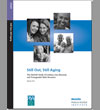News
Report - LGBT boomers expand definition of ‘family’
Thursday, March 18, 2010

A second major report focusing on aging LGBT people was released today. Yesterday, the LGBT advocacy group SAGE released a report that addresses the needs of older populations in general, including members of the WWII generation who now face issues with care facilities. The second report released today focuses on a subset of the population—boomers born between 1946 and 1964.
The study found that the LGBT boomers have a broader definition of “family” than do members of the general population and depend on their “chosen family” of friends and associates for a broad range of support.
The study was conducted by insurance company MetLife’s Mature Market Institute and by the professional group, American Society on Aging (ASA) and its constituent group, the LGBT Aging Issues Network (LAIN). ASA is co-sponsoring a major conference on aging this week in Chicago.
The report, entitled “Still Out, Still Aging” is based on results of a survey done for MetLife by Harris Interactive which collected survey responses from 1,201 individuals aged 45–64 who self-identified as lesbian, gay, bisexual, and/or transgender (LGBT). The study compares responses from that group to those from another group of roughly equal size chosen to represent the “general population”.
The study’s authors offer this description of the group they surveyed:
Poised precisely at the center of two waves of social change — a demographic one in which US society is rapidly aging and a social one in which lesbian, gay, bisexual, and transgender (LGBT) people are consistently winning civil rights and acknowledgement — are LGBT Baby Boomers. Born between 1946 and 1964, this is the cohort that advanced the US gay rights movement and within one generation succeeded in changing social attitudes from seeing homosexuality as a psychiatric condition to winning same-sex marriage and acknowledgement of their civil rights in an increasing number of states.
The survey found that only 61 percent of the LGBT boomer population were in a relationship, compared to 77 percent of the general population, but the study found that definition of “family” is more inclusive for LGBT respondents:
it is clear that the LGBT Boomers surveyed are far more reliant on close friends than are members of the comparison group. LGBT Boomers report having more close friends, are more likely to get emotional support from those friends, more often live with friends, are twice as likely to have discussed their end-of-life preferences with close friends, and are four times as likely to depend on a friend as caregiver. Nearly two-thirds say they consider their friends “chosen family.”
Relationship status of LGBT population
LGBT boomers with "chosen family"
Among the LGBT respondents who are in a relationship, more than a quarter (26 percent) of LGBT partners have gotten married, even though only five states grant marriage licenses to same-sex couples. Many (63 percent) told researchers they would marry if there was a federal law allowing gay marriage.
In a statement, MetLife highlights four results of the survey:
- 60 percent of LGBT Boomers fear being unable to care for themselves as they age; 35 percent fear becoming dependent on others
- Nearly two-thirds of LGBT Boomers say they have a “chosen family”, a group of people they consider family, even though they are not legally or biologically related
- Nearly half of the LGBT Boomers and four in ten Boomers from the general population say they don’t expect to retire until age 70 or older
- Men in both the LGBT and general population are nearly as likely as women to be giving care to another adult
Robert Stein, president and CEO of ASA, said in a the statement that the study offers guidelines for activists and lawmakers:
“We suggest that policy makers look at a number of items, including workplace and benefit changes to address the delayed age of retirement for many and a broader definition of caregivers than those now accepted by the aging industry.
“We also need to take a look at a greater public role in caregiving for those who say they have 'no one' to rely on in an emergency. Finally, there are lessons to be learned by the resilience and self-advocacy skills of the LGBT group that should be shared.”
The study found that the LGBT respondents were far more likely to have prepared living wills and to have discussed end of life issues with friends and family. But—in a finding that is of particular interest to MetLife, which sells such products—the study also found that those in the LGBT group were less likely to have long-term care insurance.
